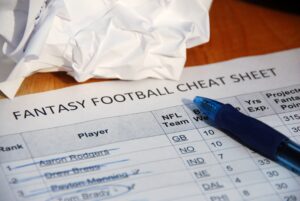Draft Day
By Ralph Maltese
April brings May flowers, hopefully, and April also brings the NFL draft. Growing up in the fifties and sixties, I do not remember the drafting of professional sports players to be that big a deal. Yes, I played stickball and baseball and football and a whole lot of basketball, but I can’t tell you, offhand, who the New York Giants drafted in the first round in 1962 (linebacker Jerry Hillebrand—ain’t the internet somethin’?)
The NFL draft draws almost as much attention as the SuperBowl. Weeks before the choosing of players begins, media personnel, who spend lifetimes exploring a potential NFL star, wade through oceans of statistics about each college/high school/high school dropout. Local bar patrons argue ferociously not on how to deal with climate change, but whether the Eagles should choose a running back or a wide receiver in the first round. A candidate’s “attributes,” from toenail size to speed running against a forty mile an hour wind in twenty degree weather are studied, and the brain trusts of every NFL team gather for hours in closed rooms with stacks of statistics on every potential draftee.
I find this sort of funny. Malcom Gladwell wrote an interesting article comparing the drafting of football players to choosing good teachers (his conclusion, I believe, was that it is more difficult to choose and hire good teachers than pick football stars-I agree). Do you remember Jamarcus Russell, Ryan Leaf, Ki-Jana Carter, Steve Emtman, Kenneth Sims?…….all number 1 draft picks.

There is this tremendous media build-up to the actual two or three day draft, cameras rolling continuously; drafted players step onto the stage and are baptized with the team’s baseball cap and team jersey. Owners, general managers, coaches, players give the usual cliches. “We always wanted Mo Blitz.” “Mo was number one on our board.” “I always dreamed, since I was a little kid, of playing for Okefenoke Swamp!” It is all rather boring.
I admit to a real prejudice. I was once involved in a draft, or actually I was not involved in a draft, and that absence still haunts me.
Polley and I were those kinds of parents who volunteered for stuff especially if no other parents were willing to volunteer. Our four children played township and scholastic sports, and, when head coaches needed assistant coaches or referees or commissioners, we offered our time and our talents—both of which were not in great supply when we participated. When Christie, our oldest, wanted to play township soccer, I stepped forward to assume the role of assistant coach. Never having played soccer or even watched a soccer game, this was going to be an intense learning curve. Fortunately, Dan, the head coach, patiently accepted my ignorance. My mother taught me that “If you read you can cook.” So I purchased the usual instruction books on “How to Teach Soccer,” and eventually learned the rules of the game and I learned to appreciate the sport. Polley and I enjoy watching the games in Europe and look forward to the World Cup.
As the years passed I became an assistant coach every year to one of my kid’s township teams. As one grows old, if one has children, the friends you hang out with change. The parents of kids who played with our children became one of our groups of friends. After all, we spent many windy, rainy, cold days on muddy fields cheering their kids and ours through seasons of soccer, baseball and basketball. We met many kind and pleasant people. Yes, the rabid parent who wanted their precious “precious” to be the star occasionally appeared on the team, but we tolerated their disjointed perspectives. There were bonds formed on those windy, rainy cold days. One of the nicest parents Tom possessed the same values as I did. Our kids were not spending their weekends playing soccer to win a gold medal at the Olympics, but they were there to get some exercise, learn the game, enjoy some comraderie, and have fun.
At the end of one season, Tom asked me if I would co-coach a soccer team next season. “I don’t have a great deal of time, and my soccer experience is not the greatest, so I was hoping to co-coach with someone like you.” I was flattered. As I always told my students, flattery always works with me. So Tom and I signed up to coach a boy’s township soccer team, the Penguins.
Our township soccer program worked like this. All potential players for the new season are evaluated. Those who have demonstrated elite soccer skills are rated “A.” Those who are pretty good are rated “B.” Average players—“C.” Those who need more skill development, “D.” And those who are totally inexperienced, “E.” In the summer, head coaches hold a draft. Each team gets to choose an A player, three B players, etc. This method was devised to, hopefully, ensure parity.
One day in August Tom called me. “I won’t be able to attend the draft. Will you attend and pick the players for our team?” I replied I could not because my school district assigned me to a program which interfered with the draft day. So I called the Commissioner of Township Soccer and explained the problem.
“I understand your problem completely. Unfortunately, we cannot move Draft Day. I will assign someone to choose for you and make certain you get the right number of A, B, C players for your team.”
Relieved, I hung up and got on with my schoolwork.
On an early September Saturday, the players chosen to become the Penguins Soccer team showed up at the appropriate field, along with their parents. Tom and I greeted everyone, explained our shortcomings as novice head coaches, and emphasized our end goals—to teach soccer, get their children some exercise, and, most of all, have fun. In a number of parents’ eyes we saw the gleam of hope, hope not only that their children will have fun, but that they will win games.

We threw out some soccer balls and asked some boys to dribble down the field. My son, Jim, did fairly well. All of his coaches in all of the sports he played said he was very coachable and smart…..all of which was true, but he and I both knew he was not an “A” player. Only Jim and one or two other boys managed to dribble the ball the length of the soccer field without kicking it out of bounds on the sidelines. One boy who had enormous difficulty controlling the ball was Harold, an unusually tall, stringy lad, who reminded me of the fictional Icabod Crane.
After all the boys had completed that exercise, we had the kids each take a penalty kick from the twelve yard line. Harold swiped and missed the ball on the first two tries. On the third he hit the ball so weakly that it barely made it to the goal line, the few brown grass stalks slowing down its speed.
Tom and I walked to the other end of the field, away from players and parents.
“Tom, look at the roster. Is our entire team here?” Tom checked the roster on his clipboard.
“Yep. Everybody that is on the Penguin team is here.”
We looked at each other. “Who is our “A” player?”
“”A” player. Who are our “B” players?!”
We put the Penguins through some more exercises and divided them up into two teams. We gave one team the orange pinnies to put over their shirts and held a scrimmage. Jim’s team scored mostly because he and a couple of others on his side knew to run to space. Most of the others simply followed the ball, including Harold.
Tom and I thanked the parents for showing up, distributed the uniforms, and scheduled the next practice.
The next day I called the Commissioner of Township Soccer.
“Bill, Tom and I were trying to figure out who is our “A” player?”
Bill said, “I’ll call the other coaches and see how the draft went and how your players were chosen.”
Bill called back the same day. “Well, it seems your top player is Harold Blankenstone.”

“Harold Blankenstone? The tall skinny kid who runs like a penguin on slippery ice and gets blown down by a summer breeze?”
“Uh, huh.”
“Bill, what qualified him to be an “A” player?”
“Well, I asked that question. The coaches reminded me that Harold is from England, you know. Just arrived two months ago.”
“England. So what?”

“Well, soccer, which they call football in the rest of the world, is big in England. Most all kids play it. It is the national sport there….well, maybe that’s cricket. Anyway, that is why your fellow coaches thought he would be an “A” player.”
“I see.”
As Tom and I learned, Harold had never played soccer…or any other sport for that matter. The next practice Tom and I tried to teach spacing and passing with mixed results. When Harold received a pass, instead of kicking the ball immediately to a teammate or trying to dribble it downfield, he would run behind the ball a few feet and rush up to kick it. By the time he took two steps, an opposing player would have stolen the ball and passed it or dribbled by Harold.
After an hour or so, Harold came up to me. “Sir, I truly must tell you that I get awfully winded going up and down the field. Might you spell me for a moment or two during the game?”
“Sure, Harold. Take a break now. Mind if I show you something when you get your wind back?”
“But of course.” And Harold sat on the September sod. When he got his breath back, I tried to show him how to stop the movement of the ball to him and how to kick it to a teammate quickly.”
At each practice, Tom and I would take turns taking our “A” player aside and teaching him how to dribble and pass and basically remain standing through the game.
We lost every game.

I once read an article by a successful football coach who believed that “a team doesn’t learn by winning every game.” That may be true. But I learned that a team doesn’t learn by losing every game. Then, again, winning, thankfully, was not our end game.
At the end of the season, as we walked off the field from our final loss, Harold came up to Tom and me. “Thank you, sirs, for a jolly good season. It was brilliant!”
I looked over at Harold’s parents standing by the sideline. They sported smiles.

Tom and I looked at the Penguins who were munching on the grapes and oranges the parents brought to every game. They were laughing and pushing and shoving each other the way boys do after every game, win or lose.
The other thing I learned from this experience is “Never miss draft day.”

